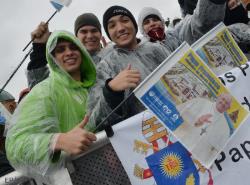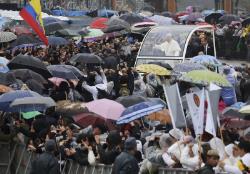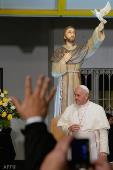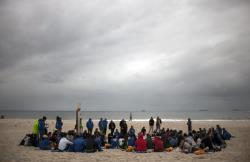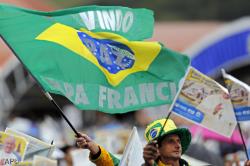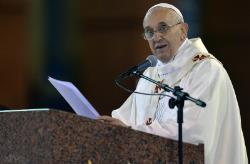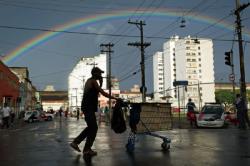
Sean-Patrick Lovett who heads the English Programme of Vatican Radio is currently in Rio de Janeiro reporting on the Apostolic visit of Pope Francis to the Brazilian nation on the occasion of the XXVIII World Youth Day. Like everyone else in Rio, Sean has been inundated by rain, which has affected everyone’s travel, including that of the Pope. He reflected on how the rain symbolizes the problems that often have to be overcome to achieve things in Brazil.
And the rain just keeps on falling. It’s been falling constantly for the past three days. WYD organizers are beginning to worry about the state of the Campus Fidei venue at Guaratiba, scheduled to host the Youth Vigil and closing Mass, because significant stretches of the area, 35 kilometres to the south of Rio, are already flooded (as are parts of the room in which our Vatican Radio studio is situated here in the Media Centre. Even as I write, volunteers are running back and forth with mops and buckets and plastic sheeting to stop the water from seeping in under the doors).
Heavy rain prevented the Pope from visiting the shrine of Christ the Redeemer up on Corcovado. Rain forced him to fly by plane and then by helicopter to Aparecida. And the rain just keeps on falling. But it did nothing to dampen the spirits of the staff, patients and participants at the encounter with the Pope at the Hospital of Sao Francisco de Assis – a Franciscan-run structure dedicated especially to treating pathologies associated with drug and alcohol abuse. Huddling beneath plastic raincoats and dripping umbrellas, they cheered and listened intently to Pope Francis as he told them they are not alone. The Pope had words of consolation for those who suffer – and words of condemnation for those he called the “dealers of death”: the scourge of drug-trafficking, he said, requires an act of courage from society. Liberalization is not the answer: we have to confront the problems underlying drug abuse through education, closeness, affection and love.
Education, closeness, affection and love are the keys to the success of the “Betania” project – fruit of the inspiration and dedication of an unassuming woman religious by the name of Sr Elci Zerma PDDM. It was in Rio’s notorious slum known as the Cidade de Deus, that Sr Elci recognised a need – and acted accordingly. What began as a ramshackle safe-house for drug addicts beside a rubbish dump thirteen years ago, is today a complex multidisciplinary program that succeeds in recuperating over 300 people a year. Under the slogan “Change is Possible”, the Friends of Betania Association offers concrete and loving assistance to the most vulnerable, emarginated and forgotten members of society – from battered women and orphans to Aids sufferers and those trying to recover from various forms of chemical abuse. The young man with the Betania heart logo on his T-shirt who addressed the Pope at the Hospital of St Francis, is one of them.
The rain, meanwhile, keeps on falling.

